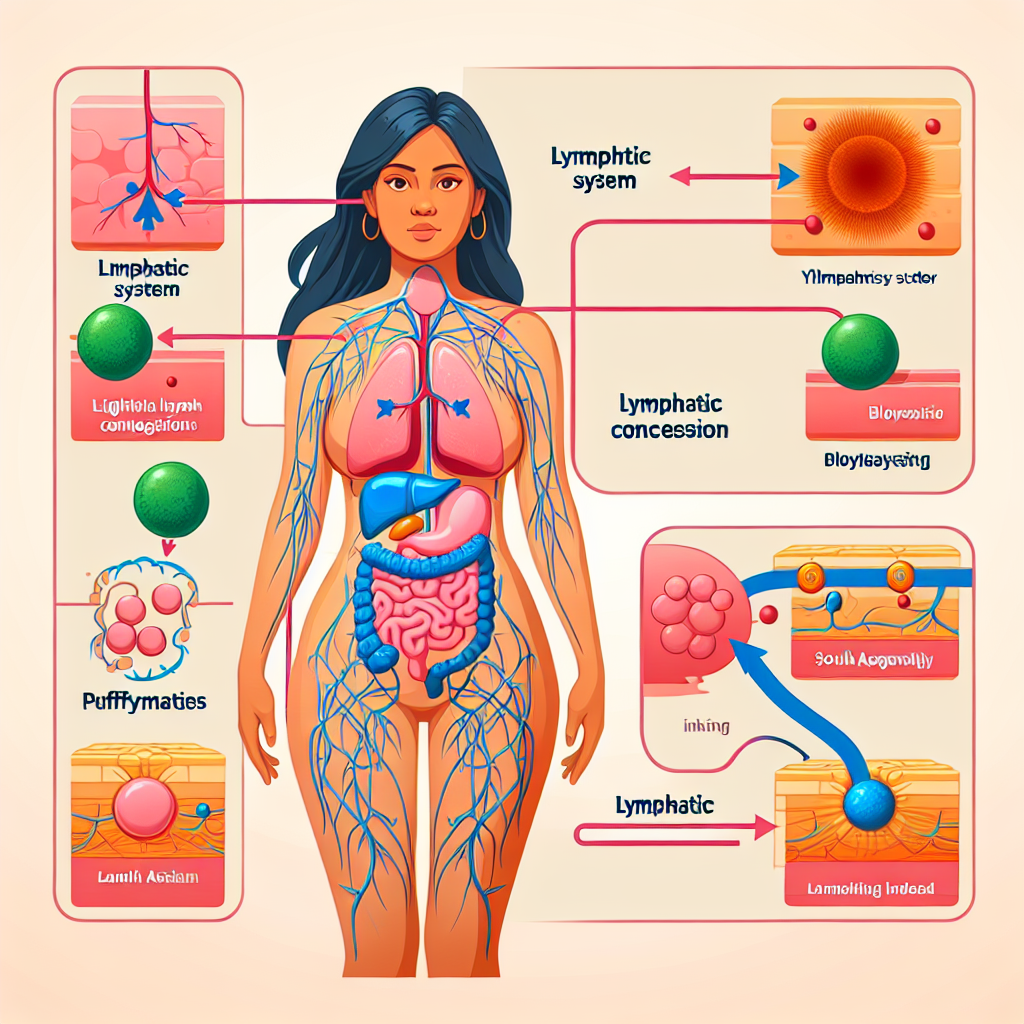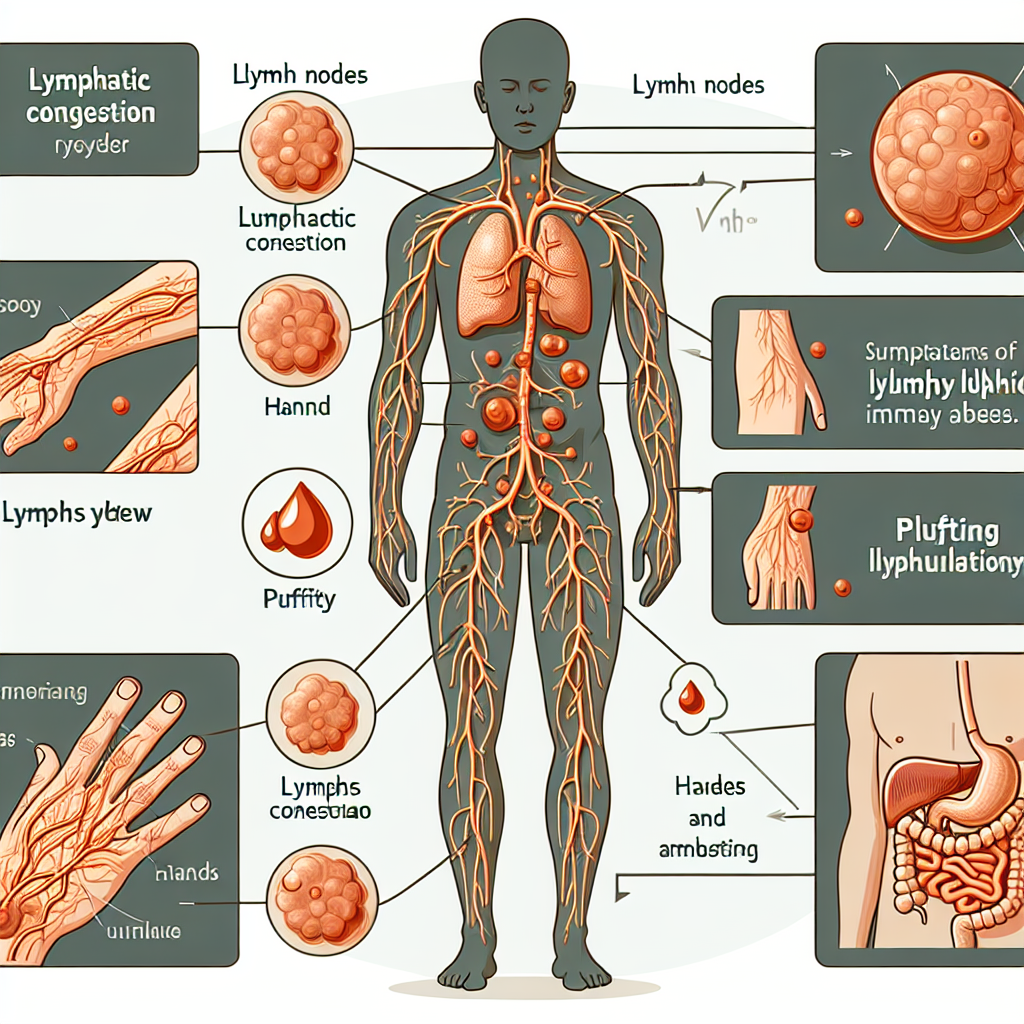How Lymphatic Congestion Causes Puffiness and Bloating

Discover how lymphatic congestion can lead to puffiness and bloating. Learn more about the causes, symptoms, and potential treatments. Don’t let your health suffer in silence. Visit Vibrant Vitality today for more information.
Understanding the Link between Lymphatic Congestion and Facial Puffiness
The human body is a complex system of interconnected parts, each playing a crucial role in maintaining overall health and well-being. One such system, often overlooked, is the lymphatic system. This network of tissues and organs is responsible for removing toxins and waste from the body. However, when this system becomes congested, it can lead to a variety of health issues, including facial puffiness and bloating. Understanding the link between lymphatic congestion and these symptoms can provide valuable insights into maintaining optimal health.
The lymphatic system is akin to the body’s internal sanitation department. It comprises a network of lymph nodes and vessels that transport lymph, a fluid containing white blood cells that fight infection. This system is crucial for the body’s immune response and for the removal of toxins and waste. However, when the lymphatic system is not functioning optimally, it can lead to lymphatic congestion. This condition occurs when the lymph fluid is not adequately drained, leading to a buildup of toxins in the body.
One of the most visible signs of lymphatic congestion is facial puffiness. This is because the face has a high concentration of lymph nodes, particularly around the eyes and jawline. When the lymphatic system is congested, the fluid can accumulate in these areas, leading to puffiness and swelling. This is often most noticeable upon waking, as the body has been at rest and the lymphatic system has not been as active.
In addition to facial puffiness, lymphatic congestion can also cause bloating. This is due to the accumulation of toxins and waste in the body, which can lead to inflammation and water retention. The digestive system, which is closely linked to the lymphatic system, can also be affected. This can result in bloating, discomfort, and a feeling of fullness, even when you have not eaten much.
Understanding the link between lymphatic congestion and these symptoms is the first step towards addressing them. There are several ways to stimulate the lymphatic system and promote optimal function. Regular exercise, particularly activities that involve jumping or bouncing, can help to stimulate lymphatic drainage. Similarly, massage, particularly lymphatic drainage massage, can also be beneficial. This involves gentle, rhythmic strokes that stimulate the lymphatic system and help to drain excess fluid.
Diet also plays a crucial role in maintaining a healthy lymphatic system. Consuming a diet rich in fruits, vegetables, and lean proteins can help to reduce inflammation and promote optimal lymphatic function. Additionally, staying hydrated is essential, as water helps to flush toxins from the body and supports the lymphatic system.
In conclusion, lymphatic congestion can lead to a variety of symptoms, including facial puffiness and bloating. Understanding the link between this condition and these symptoms can provide valuable insights into maintaining optimal health. By incorporating regular exercise, massage, and a healthy diet into your routine, you can support your lymphatic system and help to prevent these symptoms. Remember, your body is a complex system, and every part plays a crucial role in your overall health and well-being.
How Lymphatic Congestion Contributes to Bloating: An In-depth Analysis

The human body is a complex system of interconnected parts, each playing a crucial role in maintaining overall health. One such system, often overlooked, is the lymphatic system. This network of tissues and organs is responsible for removing toxins and waste from the body. However, when this system becomes congested, it can lead to a variety of health issues, including puffiness and bloating. This article aims to provide an in-depth analysis of how lymphatic congestion contributes to these conditions.
The lymphatic system is essentially the body’s internal drainage system. It is designed to rid the body of toxins, waste, and other unwanted materials. The primary function of the lymphatic system is to transport lymph, a fluid containing infection-fighting white blood cells, throughout the body. However, when the lymphatic system is not functioning optimally, it can lead to lymphatic congestion. This condition occurs when the lymphatic system is unable to properly drain lymph fluid.
Lymphatic congestion can be caused by a variety of factors, including a sedentary lifestyle, poor diet, and certain medical conditions. When the lymphatic system becomes congested, it can cause a buildup of toxins in the body. This buildup can lead to inflammation, which is often manifested as puffiness and bloating.
Puffiness, particularly in the face and eyes, is a common symptom of lymphatic congestion. This is because the lymphatic system plays a crucial role in draining excess fluids from these areas. When the system is congested, these fluids can accumulate, leading to noticeable puffiness. Similarly, bloating in the abdominal area can also be a sign of lymphatic congestion. This is due to the accumulation of toxins and waste in the digestive tract, which can cause the abdomen to swell.
Moreover, lymphatic congestion can also lead to a feeling of heaviness or fullness, particularly in the limbs. This is because the lymphatic system is responsible for draining excess fluids from these areas. When the system is congested, these fluids can build up, leading to a feeling of heaviness or discomfort.
In order to alleviate the symptoms of lymphatic congestion, it is important to stimulate the lymphatic system. This can be achieved through a variety of methods, including regular exercise, a healthy diet, and lymphatic massage. Regular exercise, particularly activities that involve jumping or bouncing, can help to stimulate the flow of lymph fluid. A healthy diet, rich in fruits and vegetables, can also support the lymphatic system by providing the necessary nutrients for optimal function. Lymphatic massage, a specialized form of massage that encourages the flow of lymph fluid, can also be beneficial.
In conclusion, lymphatic congestion can contribute significantly to puffiness and bloating. This is due to the accumulation of toxins and waste in the body, which can lead to inflammation and swelling. By understanding the role of the lymphatic system and taking steps to support its function, it is possible to alleviate these symptoms and promote overall health. Therefore, maintaining a healthy lymphatic system should be an integral part of any wellness routine.
The Role of Lymphatic Congestion in Causing Puffiness and Bloating
The lymphatic system, a vital part of our immune system, plays a crucial role in maintaining our overall health. It is responsible for the removal of waste and toxins from our body, and when it functions optimally, it contributes to our well-being. However, when the lymphatic system becomes congested, it can lead to a variety of health issues, including puffiness and bloating.
Lymphatic congestion, also known as lymphatic stagnation, occurs when the lymphatic system is unable to properly drain lymph fluid. This fluid, rich in white blood cells, is essential for fighting off infections and diseases. When the lymphatic system is functioning correctly, this fluid is efficiently transported throughout the body, ensuring that waste and toxins are effectively removed. However, when the lymphatic system becomes congested, this fluid can accumulate, leading to swelling and inflammation.
One of the most common symptoms of lymphatic congestion is puffiness, particularly in the face and eyes. This is because the lymphatic system is responsible for draining excess fluid from these areas. When the system is congested, this fluid can build up, causing the skin to appear puffy and swollen. This puffiness is often most noticeable upon waking, as the body has been lying flat for an extended period, allowing fluid to accumulate.
In addition to puffiness, lymphatic congestion can also cause bloating. This is because the lymphatic system plays a crucial role in the digestive process. It is responsible for absorbing and transporting fats and fat-soluble vitamins from the digestive system to the bloodstream. When the lymphatic system is congested, it can struggle to perform this function, leading to a buildup of waste and toxins in the digestive tract. This can result in bloating and discomfort.
Furthermore, lymphatic congestion can exacerbate existing health conditions. For instance, individuals with chronic inflammatory conditions may experience increased symptoms when their lymphatic system is congested. This is because the lymphatic system plays a key role in managing inflammation in the body. When it is unable to effectively remove waste and toxins, inflammation can increase, exacerbating symptoms.
So, how can one address lymphatic congestion and its associated symptoms? There are several strategies that can help. Regular exercise, particularly activities that involve movement of the entire body, can stimulate the lymphatic system and promote fluid drainage. Additionally, maintaining a healthy diet, rich in fruits, vegetables, and lean proteins, can support the overall health of the lymphatic system. Hydration is also crucial, as water helps to flush toxins from the body and support lymphatic function.
In some cases, manual lymphatic drainage, a type of massage that encourages the movement of lymph fluid around the body, may be beneficial. This technique can help to reduce puffiness and bloating by stimulating the lymphatic system and promoting fluid drainage. However, it’s important to consult with a healthcare professional before beginning any new treatment regimen.
In conclusion, lymphatic congestion can have a significant impact on our health, contributing to puffiness, bloating, and other health issues. By understanding the role of the lymphatic system and taking steps to support its function, we can help to mitigate these effects and promote overall well-being.